World Geography And Politics Daily News | 15 Jul 2023

Views (119)
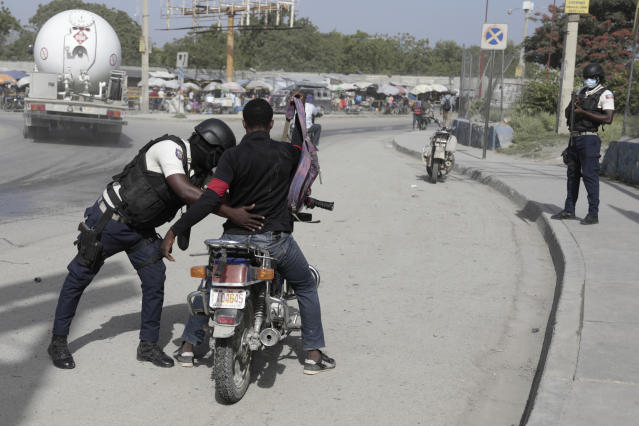
Brazil wants 10-year pause on deep sea mining as UN agency under pressure to draft regulations
Brazil on Friday urged a 10-year precautionary pause on deep sea mining in international waters just days after companies and countries were allowed to start applying for provisional licenses. The call came during a two-week conference held by the International Seabed Authority, a regulatory U.N. agency based in Jamaica that failed to approve a set of rules and regulations to govern deep sea mining by a July 9 deadline. The agency has not issued any provisional licenses, nor has it received any
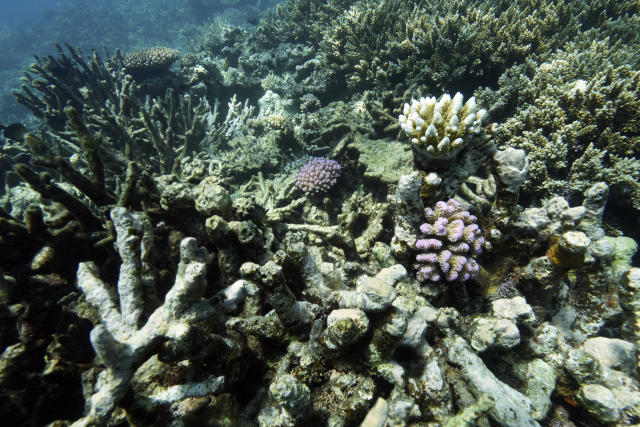
SAN JUAN, Puerto Rico (AP) — Brazil on Friday urged a 10-year precautionary pause on deep sea mining in international waters just days after companies and countries were allowed to start applying for provisional licenses.
The agency has not issued any provisional licenses, nor has it received any applications, although the government of Nauru is expected to apply soon for a license via the Canadian-based Metals Co.
The government of the tiny Pacific island said Friday that it wants to diversify its “limited economic base,” but promised it would not sponsor an application during the U.N. conference, which ends July 21.
Nauru noted that its “good-faith decision” does not mean officials are withdrawing their plan to pursue deep sea mining.
“We’re no longer in a ‘what if’ scenario, but ‘what now’?” said Margo Deiye, Nauru’s permanent representative to the International Seabed Authority.
Brazil’s representative to the International Seabed Authority, Elza Moreira Marcelino de Castro, said the country supports a precautionary pause for at least a decade.
“Priority must be given to the protection of the international seabed until conclusive and comprehensive studies … are available,” she said.
On Friday, several council members insisted on more scientific studies before any licenses are awarded.
The U.N. agency has issued more than 30 exploration licenses, with most of the activity focused in the Clarion-Clipperton Fracture Zone, which covers 1.7 million square miles (4.5 million square kilometers) between Hawaii and Mexico. Exploration is occurring at depths ranging from 13,000 to 19,000 feet (4,000 to 6,000 meters).
The U.N. agency’s 36-member council is working on a proposed framework that would regulate potential deep sea mining, but it’s unclear when it would be ready.
“Exploitation in the area should not be carried out in the absence of rules, regulations and procedures,” Gina Guillén, Costa Rica’s representative, said in a statement that represented the stance of more than a dozen countries.
Australia’s representative said Friday that it was clear draft regulations would not be ready before the conference ends nor by the next meeting scheduled for October and November.
Ukraine Recap: Grain Deal Renewal Is Coming Down to the Wire
(Bloomberg) -- The Black Sea safe-transit deal that’s allowed Ukraine to export millions of tons of grain in the past year expires on Monday, and a potential decision by Russia to renew it is coming down to the wire. Turkish President Recep Tayyip Erdogan told reporters he hopes a letter sent to Vladimir Putin by UN Secretary General Antonio Guterres this week will help to secure an extension of pact. So far Russia has made no statement on extending the deal, Putin says he’s still deliberating,

(Bloomberg) -- The Black Sea safe-transit deal that’s allowed Ukraine to export millions of tons of grain in the past year expires on Monday, and a potential decision by Russia to renew it is coming down to the wire. Turkish President Recep Tayyip Erdogan told reporters he hopes a letter sent to Vladimir Putin by UN Secretary General Antonio Guterres this week will help to secure an extension of pact. So far Russia has made no statement on extending the deal, Putin says he’s still deliberating, and Moscow has frequently derided the pact as unfair to its interests.
Most Read from Bloomberg
Putin told a Russian newspaper that he offered Wagner mercenary forces the option of continuing to serve as a single unit under the same commander when he met with them after last month’s failed mutiny, the Associated Press reported. “All of them could have gathered in one place and continued to serve,” Putin told Kommersant. “And nothing would have changed for them. A group of Wagner mercenaries was shown in a Belarusian defense ministry video on Friday, training territorial troops in the Russian ally, about 100 kilometers (62 miles) southeast of the capital Minsk.
Germany’s finance minister said further financing of support for Ukraine should be distinct from the EU’s long-term budget, and that the bloc will continue to find ways to help Kyiv. In the US, the House of Representatives defeated an effort by far-right Republicans to cut off security assistance to Ukraine, cementing — for now — a wall of bipartisan support for Kyiv. Yet a senior US intelligence official said the conflict has reached a stalemate in its 17th month, a downbeat assessment that could strain allies’ patience.
Latest Coverage
Pentagon Says Cluster Munitions Have Arrived in Ukraine: AP
BRICS Leaders to Discuss Russian War in Ukraine at August Summit
Lindner Says Further Ukraine Aid Must Be Outside EU Budget
Russian Wagner Mercenaries Emerge in Belarus as Troop Trainers
Ukraine Bonds Set for Weekly Gain; BofA Stays Overweight
Coming Up
Russia’s Sergei Lavrov at ASEAN meeting in Indonesia
Black Sea grain export deal set to expire Monday
Markets
Oil Heads for Third Weekly Gain
Oil headed for a third weekly gain as supply disruptions in Africa and a reduction in shipments from Russia tightened the market. Russian flows are finally starting to decline, four months after the country was due to slash output.
Most Read from Bloomberg Businessweek
©2023 Bloomberg L.P.
Security Council gives UN chief 30 days to come up with options on how to fight Haiti's armed gangs
The U.N. Security Council asked the secretary-general on Friday to come up with options to help combat Haiti’s armed gangs, including a possible U.N. peacekeeping force and a non-U.N. multinational force. A resolution adopted unanimously by the council asks U.N. Secretary-General Antonio Guterres to report back on “a full range” of options within 30 days to improve the security situation, including additional training for the Haitian National Police and providing support to combat illegal arms trafficking to the impoverished Caribbean nation.

UNITED NATIONS (AP) — The U.N. Security Council asked the secretary-general on Friday to come up with options to help combat Haiti’s armed gangs, including a possible U.N. peacekeeping force and a non-U.N. multinational force.
A resolution adopted unanimously by the council asks U.N. Secretary-General Antonio Guterres to report back on “a full range” of options within 30 days to improve the security situation, including additional training for the Haitian National Police and providing support to combat illegal arms trafficking to the impoverished Caribbean nation.
Haiti’s Prime Minister Ariel Henry sent an urgent appeal last October for “the immediate deployment of a specialized armed force, in sufficient quantity” to stop the gangs. However, more than eight months later no country has stepped up to lead such a force.
Guterres, who visited Haiti earlier this month, called last week for a robust international force to help the Haitian National Police “defeat and dismantle the gangs.”
Compounding the gang warfare is the country’s political crisis: Haiti was stripped of all democratically elected institutions when the terms of the country’s remaining 10 senators expired in early January.
The resolution, co-sponsored by the United States and Ecuador, “strongly urges” all countries to prohibit the supply, sale or transfer of weapons to anyone supporting gang violence and criminal activities.
It reiterates the need for all Haitians, with support from the U.N. political mission known as BIHUH, to establish “a Haitian-led, Haitian-owned political process to permit the organization of free, fair and credible legislative and presidential elections.” And it calls on the Haitians “to urgently reach an agreement on a sustainable, time-bound and commonly accepted roadmap for elections.”
The resolution extends BINUH’s mandate until July 15, 2024, and also encourages the mission “to explore options to enhance the Haitian criminal justice sector in order to fight impunity.”
U.S. Ambassador Linda Thomas-Greenfield called the resolution an important step to help the Haitian people shape their future and restore democratic order.
But she said, “we must do more,” and urged all 15 council members to join the U.S. in working with BINUH, the Haitian government and the international community to “help the Haitian people secure a more just and peaceful future.”
China’s deputy U.N. ambassador Geng Shuang reiterated Beijing’s position that the most urgent task is to stabilize the security situation and stop the flow of arms, otherwise “no amount of support for the Haitian National Police will make any difference.”
He stressed that the U.N.’s actions in Haiti over some 30 years “have shown that quick fixes implemented from the outside often fail to deliver long-term results that will help Haiti truly emerge from the crisis.”
“The United Nations should fully learn from the past,” Geng said.
US climate envoy John Kerry declines to call Xi Jinping a 'dictator'
United States climate envoy John Kerry refused to describe Chinese President Xi Jinping as a "dictator" during a hearing with House Republicans on Thursday. The hearing: Ahead of his Beijing trip on Sunday, the former secretary of state faced Republicans from the House Foreign Affairs Committee’s oversight subcommittee, who expressed concerns about engaging in climate negotiations with China. During the hearing, the GOP lawmakers questioned the upcoming talks, citing China’s alleged human rights abuses, its reluctance to cut its fossil fuel emissions and its issues regarding forced labor.
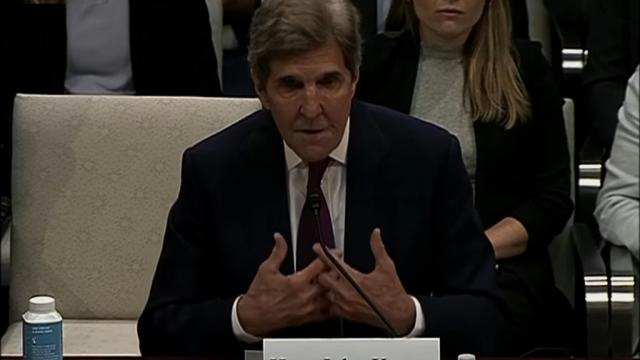
United States climate envoy John Kerry refused to describe Chinese President Xi Jinping as a "dictator" during a hearing with House Republicans on Thursday.
Each time, Kerry chose not to repeat the term, instead calling the Chinese Communist Party general secretary “the major decider of the direction and of the policies of China.”
“Is he in fact, effectively a dictator?” asked Issa.
“Well, I’m not, I don’t think it’s useful to get into, I’m not going to get into-” Kerry began before Issa cut him off again.
“But he does wield the power of a dictator?” Issa inquired.
“He wields enormous power as the leader of China, absolutely,” conceded Kerry. “And everybody understands that. But I don’t, you know-”
Issa then asked Kerry if he wished “the president had used another word.”
“No, I don’t even, I don’t, I just, frankly, all of that is water off the duck’s back, and, you know, I don’t think we ought to get tangled up in, you know, labels and names and whatever," Kerry asserted. “What we ought to do is look at the heart of what we’re trying to do.”
He then noted that Biden and Xi have a “very good relationship,” which Xi “honors.”
On cutting emissions: The lawmakers questioned the appropriateness of negotiating with a country they view as untrustworthy in addressing emissions.
According to Foreign Affairs Committee Chairperson Rep. Michael McCaul (R, TX-10), China fires a “coal plant up pretty much every day, if not week.”
They also criticized China’s claims that it is still a “developing country” and should not be held to the same climate standards as developed Western economies. While Kerry acknowledged the sentiment, he emphasized that global progress on cutting emissions should not be hindered by the disparity.
He recognized that persuading China to conform to the same emissions-cutting standards as other major economies might not occur during his visit, but he expressed optimism that the Chinese government “understands this is a growing issue of concern.”
US sending F-16 fighter jets to protect ships from Iranian seizures in Gulf region
The U.S. is beefing up its use of fighter jets around the strategic Strait of Hormuz to protect ships from Iranian seizures, a senior defense official said Friday, adding that the U.S. is increasingly concerned about the growing ties between Iran, Russia and Syria across the Middle East. Speaking to Pentagon reporters, the official said the U.S. will send F-16 fighter jets to the Gulf region this weekend to augment the A-10 attack aircraft that have been patrolling there for more than a week. Th
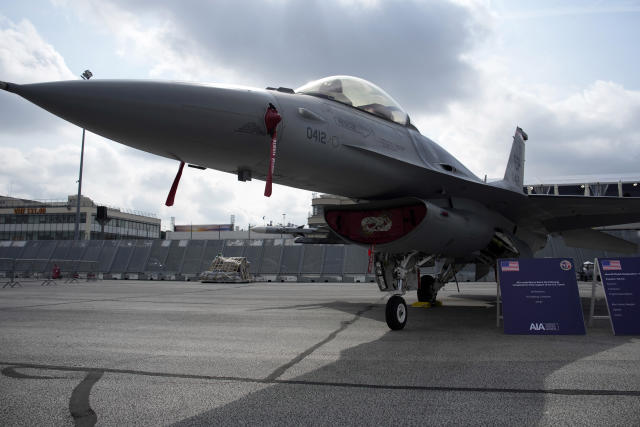
WASHINGTON (AP) — The U.S. is beefing up its use of fighter jets around the strategic Strait of Hormuz to protect ships from Iranian seizures, a senior defense official said Friday, adding that the U.S. is increasingly concerned about the growing ties between Iran, Russia and Syria across the Middle East.
The defense official, who spoke on condition of anonymity to provide details of military operations in the region, said the F-16s will give air cover to the ships moving through the waterway and increase the military's visibility in the area, as a deterrent to Iran.
The U.S. Navy said in both instances the Iranian naval vessels backed off when the USS McFaul, a guided-missile destroyer, arrived on the scene.
In addition, the defense official told reporters the U.S. is considering a number of military options to address increasing Russian aggression in the skies over Syria, which complicated efforts to strike an Islamic State group leader last weekend. The official declined to detail the options, but said the U.S. will not cede any territory and will continue to fly in the western part of the country on anti-Islamic State missions.
The Russian military activity, which has increased in frequency and aggression since March, stems from growing cooperation and coordination between Moscow, Tehran and the Syrian government to try to pressure the U.S. to leave Syria, the official said.
The official said Russia is beholden to Iran for its support in the war in Ukraine, and Tehran wants the U.S. out of Syria so it can more easily move lethal aid to Lebanese Hezbollah and threaten Israel. The U.S. has seen more cooperation, collaboration, planning and intelligence sharing, largely between mid-level Russian and Iranian Quds force leaders in Syria, to pressure the U.S. to remove troops from Syria, the official added.
The U.S. does not believe Russian aircraft plan to drop bombs on U.S. troops or shoot down manned aircraft. But there are concerns that Russian pilots will knock a Reaper drone out of the sky and that Moscow believes that type of action would not get a strong U.S. military response, the official said.
As an example, in March, a Russian warplane poured jet fuel on a U.S. surveillance drone and then struck its propeller, forcing the U.S. military to ditch the MQ-9 Reaper into the Black Sea. The incident spiked tensions between the two countries and triggered a call between their defense chiefs, but led to no direct military response.
Last week, Rear Adm. Oleg Gurinov, head of the Russian Reconciliation Center for Syria, said the Russian and Syrian militaries have been doing joint training. In comments carried by Syrian state media, he said Moscow is concerned about drone flights by the U.S.-led coalition over northern Syria, calling them “systematic violations of protocols” designed to avoid clashes between the two militaries.
U.S. and Russian military commanders routinely communicate over a deconfliction phone line that has been in place for several years to avoid unintended clashes in Syria, where both sides have troops on the ground and in the air.
There are often many calls a day, and at times result in angry threats as commanders argue over an ongoing operation, said the U.S. official. Describing a conversation, the official said the Russians will often declare an area of space a restricted operating zone and say they are doing military exercises there.
The U.S. sees no exercises, and tells Russia that American forces are on a counterterror mission against the Islamic State group and plan to fly in that area. The Russians then say they can't guarantee U.S. aircraft safety if they go there. And once the mission begins, and the aircraft move into the zone, “it sometimes gets very heated,” said the official, as both sides loudly protest and reject the other's assertions.
The most recent incident was Friday morning, when a Russia aircraft flew repeatedly over the at-Tanf garrison in eastern Syria, where U.S. forces are training Syrian allies and monitoring Islamic State militant activity. The official said the Russian An-30 aircraft was collecting intelligence on the base.
The U.S. did not have fighter aircraft in the area and took no direct action against the Russian flight.
Haiti human rights group warns kidnappings and killings are on the rise after a brief respite
A leading human rights group in Haiti warned about an upsurge in killings and kidnappings as the U.N. Security Council met Friday to discuss the country’s worsening violence. In a report issued Thursday, the National Human Rights Defense Network also condemned what it called the government’s inaction. Among those killed are an attorney, a schoolboy, two morticians and at least six police officers.
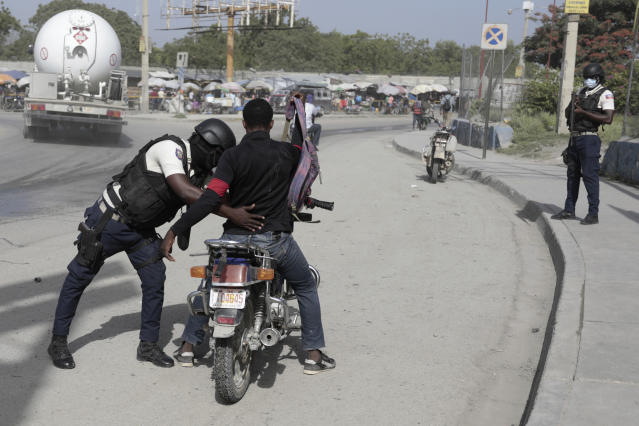
SAN JUAN, Puerto Rico (AP) — A leading human rights group in Haiti warned about an upsurge in killings and kidnappings as the U.N. Security Council met Friday to discuss the country’s worsening violence.
In a report issued Thursday, the National Human Rights Defense Network also condemned what it called the government’s inaction.
It noted that from May 1 to July 12, at least 75 people were killed and another 40 abducted. Among those killed are an attorney, a schoolboy, two morticians and at least six police officers. Those kidnapped include a female journalist from Radio Vision 2000 who was later released. Her husband, the former president of Haiti’s Provisional Electoral Council, was abducted in mid-June and is still being held by gang members.
Gangs are also accused of breaking into a hospital in the community of Canaan in the northern part of the capital, Port-au-Prince, stealing medical supplies and abducting at least six security guards. In addition, armed criminals last month set fire to the building that housed the Jamaican consulate in Haiti.
The group urged authorities to disband all armed gangs and restore order and security.
0 Likes
